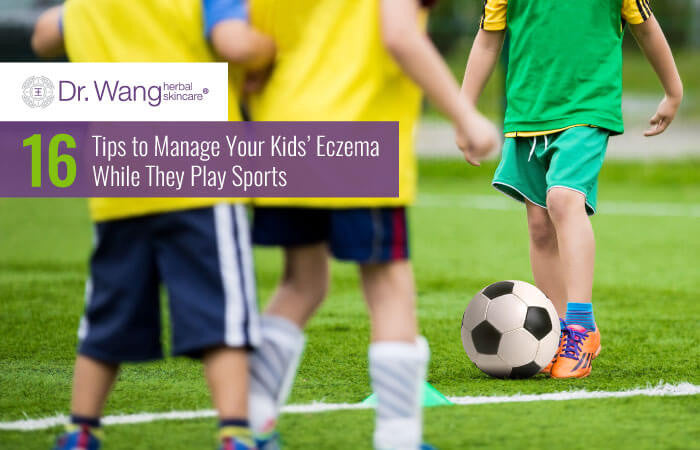
During the school year, parents expect the usual load of homework, projects, and social activities. These tasks, and environmental stress from changing seasons, can aggravate your child’s eczema.
Keep in mind you may also need to prepare for one thing that can significantly exacerbate your child’s atopic dermatitis: sports.
Extreme sweating is known to make the skin react negatively, especially so for those who have eczema. It is vital that the skin stays cool as possible during playtime to avoid the effects of eczema.
In this article, we have collected the best practices to help your child reduce the effects of atopic dermatitis without compromising his or her sports participation!

Manage the Circumstances
Before playing, make sure that your child and the coach are informed about eczema and the protective measures you want to take. Once everyone is on board with the plan, it will be easier to execute. Teachers should be aware of your child’s condition so they can provide support!
- Water should be available at all times to drink or spritz on his/herself. Water will keep your child hydrated and prevent the skin from getting inflamed.
- Most importantly, your child should wipe or pat away sweat, as the salt and mineral content in the sweat can irritate the skin.
- Play in the shade if possible. This can be done if the sports activities are scheduled in the late afternoon. It is best to avoid outdoor play from 11:00am to 3:00pm, since these are generally the sunniest times of the day.
- Bring a fan. This will help your child cool down.
- Wear comfortable clothing that allows the skin to breathe. Light-colored clothes are preferred because dark clothes absorb more heat. Visors are also highly recommended.
- Your child should only wear smooth fabrics. Avoid those made of synthetic materials because they are abrasive and can irritate the skin.
- Place ice cubes in the child’s hat if the weather is hot and humid. You can put ice cubes in a plastic bag and tie them before putting them inside the hat. This will keep the hat cool before your child puts it on!
- Wear gloves for games that require arduous activities for your child’s hands. This should prevent friction from occurring.
- Prevent skin friction as much as possible on your child’s body. You can do this by applying emollients on the skin.
- Use baby powder or a specially formulated powder to keep your child’s feet and hands dry. Make sure socks are worn at all times.
Manage the Body
Before jumping into any game, the child’s body must have been prepared to combat atopic dermatitis. It is also important that your child has enough supply of medications in a sports bag, which he or she can use in case of aggravated situations. The following things are strongly advised:
- If your child is swimming, be sure he or she rinses off the pool water directly after swimming, then apply emollients as soon as possible. Pool water dries the skin and can cause serious irritations.
- Make sure that the sunscreens your child uses are all hypo-allergenic. This means that the products were manufactured with materials that do not cause allergy. Also, look for products that are “PABA-FREE” or those that are dermatologist-tested. Products that have active zinc and titanium ingredients are the best.
- Be sure your child understands how bacteria can spread! Scrapes and cuts can happen on the field, and he or she should know that bacteria can spread quickly between open wounds.
- A simple cut or scrape should not be ignored. Sanitize these right away and put a bandage around them. This should prevent skin irritation and infection.
- Do not use adhesives as an alternative to bandages. Use only medically-recognized products.
- Your child should also use lip balm to prevent dry skin and cracking on the lips
Eczema does not need to be an obstacle for children to play and live a normal life. If all these steps are observed, your child can have a fun school year and enjoy sports without suffering from eczema flares. With this in mind, you will have a healthy, happy child who is given a fair chance to improve their physical and social skills, and most importantly, have fun!




My 16 yrs old boy has a very bad ezcema. He bleeds and it itches. He has it in his nand and his poor hand looks as if he is all cut.
I purchased your product Dr. Wang eczema ointment, the purple ointment,on HSN and now they are not selling it. I am on your website but all I see are articles and descriptions of eczema. Do you sell this product. I am missing something. Please advise.